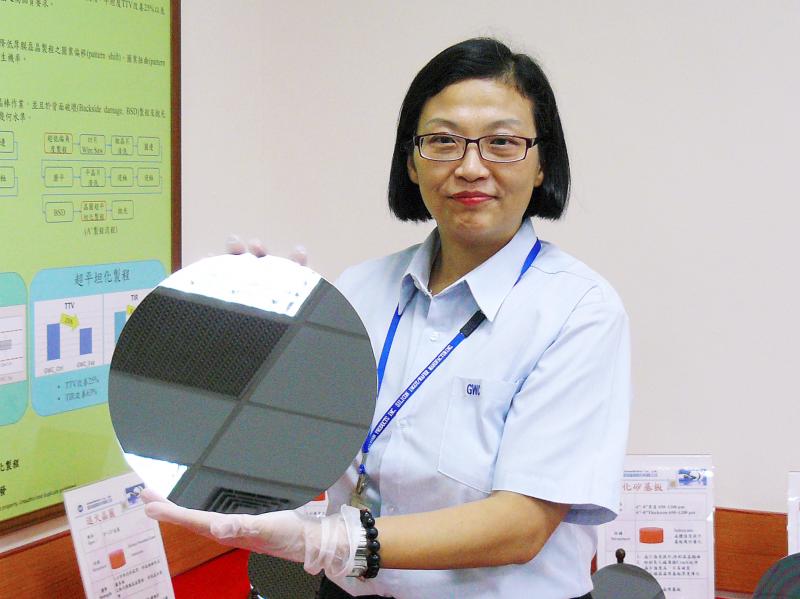GlobalWafers Co (環球晶圓) plans to start construction on a US$5 billion wafer fabrication facility in Texas in November, after passage of the US$52 billion Creating Helpful Incentives to Produce Semiconductors (CHIPS) for America Act.
The fab would be the largest of its kind in the US and one of the largest in the world, with a monthly capacity of 1.2 million wafers, GlobalWafers said, adding that the investment would be the first new fab in the US in more than 20 years and critical to closing a semiconductor supply chain gap.
The world’s No. 3 silicon wafer supplier said the project, which would have multiple stages, is to begin with an investment of about NT$55 billion (US$1.85 billion) to build a monthly capacity of 15,000 wafers.

Photo: CNA
The production is expected to begin in 2025, if everything goes smoothly, GlobalWafers said.
“This [the passage of the CHIPS Act] is the only factor we have no control over... The CHIPS Act funding is crucial for us. In other words, if the act’s passage is delayed for too long, we will certainly need to adjust for that. We have some contingency plans ready,” GlobalWafers chairwoman Doris Hsu (徐秀蘭) told a news briefing yesterday. “We cannot wait for a long time. We have secured a lot of long-term supply agreements from our customers.”
About 80 percent of the new manufacturing facility’s capacity has been booked, the company said.
To start construction in November, the act would need to pass before the US Congress’ August recess.
GlobalWafers said the government subsidies were one of the main reasons it opted to build the fab in Texas.
Funding from the US government would help to offset the high cost of construction in the US and alleviate some of the financial pressure in the initial operating stages, Hsu said.
The company was also drawn to the US because of rapidly growing demand from its customers there, Hsu said.
There are a substantial number of firms in the US semiconductor supply chain, from polysilicon suppliers, foundries and integrated devices manufacturers to chip design houses, she added.
The world’s major chipmakers, including Taiwan Semiconductor Manufacturing Co (台積電), GlobalFoundries Inc, Intel Corp, Samsung Electronics Co and Texas Instruments Inc, have announced plans to construct new factories in the US.
“With the global chip shortage and ongoing geopolitical concerns, GlobalWafers is taking this chance to address the issue of the resiliency of the US’ semiconductor supply chain by building an advanced node, state-of-the-art, 300mm silicon wafer factory,” Hsu said.
GlobalWafers has two fabs in the US, one in Texas and one in Missouri.
Separately, GlobalWafers said that the Ministry of Economic Affairs’ decision to increase the cost of electricity for industrial heavy users by 15 percent far exceeded what it had expected and would add to its operating costs.
GlobalWafers said it supports rate hikes and hopes that the increase would result in a stable, high-quality power supply.
The cost increase from the rate hike should be manageable, the company said, adding that it would step up power conservation measures and increase green energy adoption to minimize the impact.

The US government has signed defense cooperation agreements with Japan and the Philippines to boost the deterrence capabilities of countries in the first island chain, a report by the National Security Bureau (NSB) showed. The main countries on the first island chain include the two nations and Taiwan. The bureau is to present the report at a meeting of the legislature’s Foreign Affairs and National Defense Committee tomorrow. The US military has deployed Typhon missile systems to Japan’s Yamaguchi Prefecture and Zambales province in the Philippines during their joint military exercises. It has also installed NMESIS anti-ship systems in Japan’s Okinawa

‘WIN-WIN’: The Philippines, and central and eastern European countries are important potential drone cooperation partners, Minister of Foreign Affairs Lin Chia-lung said Minister of Foreign Affairs Lin Chia-lung (林佳龍) in an interview published yesterday confirmed that there are joint ventures between Taiwan and Poland in the drone industry. Lin made the remark in an exclusive interview with the Chinese-language Liberty Times (the Taipei Times’ sister paper). The government-backed Taiwan Excellence Drone International Business Opportunities Alliance and the Polish Chamber of Unmanned Systems on Wednesday last week signed a memorandum of understanding in Poland to develop a “non-China” supply chain for drones and work together on key technologies. Asked if Taiwan prioritized Poland among central and eastern European countries in drone collaboration, Lin

NO CONFIDENCE MOTION? The premier said that being toppled by the legislature for defending the Constitution would be a democratic badge of honor for him Premier Cho Jung-tai (卓榮泰) yesterday announced that the Cabinet would not countersign the amendments to the local revenue-sharing law passed by the Legislative Yuan last month. Cho said the decision not to countersign the amendments to the Act Governing the Allocation of Government Revenues and Expenditures (財政收支劃分法) was made in accordance with the Constitution. “The decision aims to safeguard our Constitution,” he said. The Constitution stipulates the president shall, in accordance with law, promulgate laws and issue mandates with the countersignature of the head of the Executive Yuan, or with the countersignatures of both the head of the Executive Yuan and ministers or

CABINET APPROVAL: People seeking assisted reproduction must be assessed to determine whether they would be adequate parents, the planned changes say Proposed amendments to the Assisted Reproduction Act (人工生殖法) advanced yesterday by the Executive Yuan would grant married lesbian couples and single women access to legal assisted reproductive services. The proposed revisions are “based on the fundamental principle of respecting women’s reproductive autonomy,” Cabinet spokesperson Michelle Lee (李慧芝) quoted Vice Premier Cheng Li-chiun (鄭麗君), who presided over a Cabinet meeting earlier yesterday, as saying at the briefing. The draft amendment would be submitted to the legislature for review. The Ministry of Health and Welfare, which proposed the amendments, said that experts on children’s rights, gender equality, law and medicine attended cross-disciplinary meetings, adding that